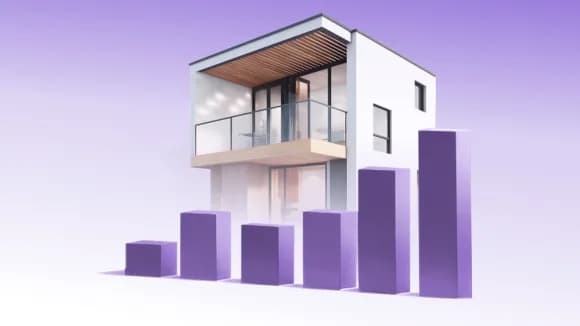
Number Crunching
How long can rents keep going up?
Rents have increased by 4.82% per year over the last 20 years. Is that rate of growth sustainable?
Number Crunching
7 min read

In New Zealand, over the last 32+ years rents have increased 4.32% annually (on average).
But that's an average.
That doesn't means your property's rent will go up by exactly 4.32% every year.
Rental increases fluctuate. Sometimes rents will go up faster than average. Sometimes rents will go up slower than average.
For example, New Zealand's median rent increased -0.17% over the last 12 months. This is slower than the long-term average.
Do you have a question or comment about the rent increases? Feel free to leave your thoughts in the comment section at the end of the page.
Rents don't go up at the same pace everywhere.
Sometimes Auckland rents will go up quickly, while they are flat in Nelson. Sometimes, Dunedin rents will spike, while they're flat in Hamilton.
Over the last 12 months, rents went up fastest in Southland Region. Rents there are up 11.1%.
Rents went up slowest in Wellington Region. Over the same timeframe, rents there went down 7.1%.
Here's a table that summarises the rent changes:
No, rent increases change every year based on what’s going on at the time.
From the above graph, we can see rents have only stagnated twice at a national level.
During mid-1999 rents were falling by 0.6% per year. This was chiefly due to the recession we were going through at the time. However, during the economic recovery and rebound from that downturn, rents skyrocketed and grew 11% per year by late 2003.
More recently, rental increases have hovered consistently between 4 - 6% per year.
Here at Opes Property Management, we primarily operate in Auckland and Canterbury. So here is what I am seeing in some of the major cities as a property manager.
At Opes Property Management, we’ve seen steady rent increases. This is both for Christchurch, and wider Canterbury.
Last January, I worked with a pair of investors. We rented their 3-bed, 1.5-bathroom townhouse for $545 a week. 12 months later, the new tenants signed a contract for $620 a week.
That’s a massive $75 a week rent increase.
In Rolleston, we've seen some rents jump 10%. A brand new 4-bedroom standalone property renting for $600, could now rent for $660 – 12 months later.
But New Build properties tend to get premium rent increases for the first few years. This is because they are brand spanking new.
The premium rent may ‘settle’ into the market after a few years. After that they'll start to see more typical annual increases.
In Christchurch City, the average expected rent for all property types are:
Source: TradeMe, February 2024
Auckland rents are also increasing quickly.
In February 2024, the average median rent was $680 a week. This is up 8% compared to this time last year.
For townhouses, the average expected rent was even higher, at $720 a week.
The investors we work with tend to do well with townhouses on the fringes of the city. Here tenancies are shorter (they turn over every 12 months) and rents tend to increase quicker.
In Auckland, the average expected rent for all property types are:
Source: TradeMe, February 2024
When you create a long-term property investment cashflow, you need to forecast how fast you think rents will increase in future.
Here at Opes Partners we tend to use the average annual increase from the past 20 years. Right now, that’s 4.26% per year.
Depending on which timeframe you look at, the rate you use will be different. For instance, over the last 10 years rents have increased 4.66%. Over the last 32 years the rate has been 4.32%.
I recommend using the 20-year average rate. That's because it has a mix of longevity (20 years is a long time), while it's also current.
If you use this timeframe as your forecast you'll ignore data from earlier than that period, aka 1993 to October 2005.
But why would you ignore certain data?
Well, the rental increases over that period were 4.44% per year, which is slower than the rental increases we’ve seen over the last 20 years at 4.26%.
And as you’ll see above, rental increases have been more consistent recently. So I don’t think that earlier period is as relevant when thinking about the increases you might get in the future.
Use this tool and find out in 2 minutes if you can afford an investment property
Find out nowA forecast is a forecast.
Just because you put a number in a spreadsheet, it doesn’t mean it will happen.
If you want to see your rents increase over time, you need to regularly review the rents you're charging. To increase your rent, you need to give notice to your tenants that the rent is increasing.
Under the Residential Tenancies Act, you can do this once every 12 months for an ongoing tenancy.
But remember, when increasing rents, you need to be prepared that your tenants could give notice and walk away.

Business Development Manager with 5 years Property Management industry experience. Property Investor in Christchurch
Tom Greene is the Business Development Manager at Opes Property Management in Christchurch with over five years of industry experience and is also an experienced property investor. Tom provides tenancy guidance and insight to those both starting and continuing their investment journey.
This article is for your general information. It’s not financial advice. See here for details about our Financial Advice Provider Disclosure. So Opes isn’t telling you what to do with your own money.
We’ve made every effort to make sure the information is accurate. But we occasionally get the odd fact wrong. Make sure you do your own research or talk to a financial adviser before making any investment decisions.
You might like to use us or another financial adviser